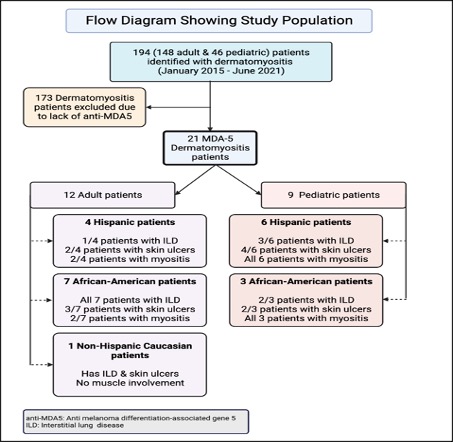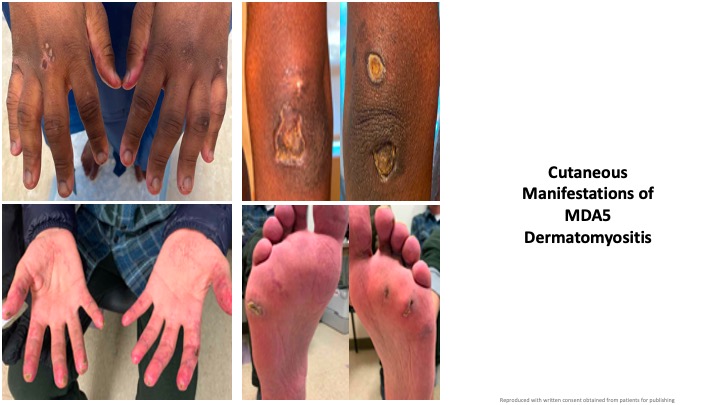Session Information
Date: Monday, November 13, 2023
Title: (1155–1182) Muscle Biology, Myositis & Myopathies – Basic & Clinical Science Poster II
Session Type: Poster Session B
Session Time: 9:00AM-11:00AM
Background/Purpose: Anti-melanoma differentiation-associated gene 5 (anti-MDA5) antibody dermatomyositis typically expresses rapidly progressing interstitial lung disease (RP-ILD) and ulcerative skin lesions, with or without muscle involvement. There is a lack of understanding on early diagnosis and treatment to avoid untoward outcomes. Our objective was to identify distinguishing clinical and laboratory features to assess disease progression amongst a diverse cohort with anti-MDA5 dermatomyositis based on serologic, histopathologic, and radiographic status.
Methods: We studied the disease phenotype in a racially diverse juvenile and adult population with anti-MDA5 dermatomyositis at our institution through a retrospective chart review. We identified 194 dermatomyositis patients, 21 of whom were MDA5 antibody positive. Data were analyzed by Fischer’s exact test and ANOVA.
Results: Twelve adult patients represented 8% of all adult dermatomyositis cases (12/148) and 9 represented 19 % of the pediatric dermatomyositis cases (9/46). In adult patients, the mean age of disease onset was 45.2 years (SD 14.4 years). Nine adult ILD cases were noted, of which 2 were RP-ILD. The presence of the Ro52 antibody was associated with rapid disease progression. In the pediatric group, the mean age of onset was 6.6 years (SD 4.9 years). All children had muscle weakness, and 5 had ILD. Myositis was noted to be more prevalent in the pediatric population, compared to adults respectively (9/9 Vs. 4/12 cases; p=0.05). ILD was statistically significant in the African American population (9/10 Vs. 5/11 cases, p=0.03) and of these 3 cases had fatal RP-ILD. The combined mortality rate of 14.2% was more favorable than the 40-60% reported in the literature.
Conclusion: The general disease characteristics of our cohort were similar in both adult and pediatric patients except for myositis, which was more common in the pediatric population. The incidence of ILD was higher in adults, especially in the African American population who had worse outcomes. The rapid escalation of therapy and use of rituximab may have improved our outcomes over historic controls.
To cite this abstract in AMA style:
Koyoda S, Wahezi D, Xie X, Kumthekar A, Tagoe C, Ayesha B. Anti-melanoma Differentiation Associated Gene 5 (Anti-MDA5) Antibody Dermatomyositis: Clinical Features and Outcome in a Racially Diverse Patient Cohort [abstract]. Arthritis Rheumatol. 2023; 75 (suppl 9). https://acrabstracts.org/abstract/anti-melanoma-differentiation-associated-gene-5-anti-mda5-antibody-dermatomyositis-clinical-features-and-outcome-in-a-racially-diverse-patient-cohort/. Accessed .« Back to ACR Convergence 2023
ACR Meeting Abstracts - https://acrabstracts.org/abstract/anti-melanoma-differentiation-associated-gene-5-anti-mda5-antibody-dermatomyositis-clinical-features-and-outcome-in-a-racially-diverse-patient-cohort/


